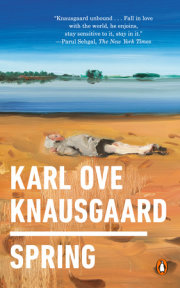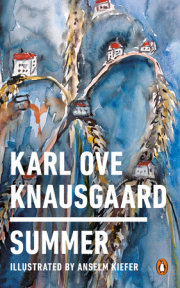Letter to an Unborn Daughter
2 December. You have lain inside the belly all summer and all autumn. Surrounded by water and darkness, you have grown through the various stages of foetal development, which from the outside resemble the human species' own evolution, from a prehistoric, shrimp-like creature, its spine shaped like a tail and the skin covering the centimetre-long body so thin that its insides show clearly through it - like one of those rain jackets of transparent plastic, which you will see one day and perhaps think, as I do, that there is something obscene about them, maybe because it seems to run counter to nature to see through skin, and that kind of rain jacket is like a skin we put on - to the first mammal-like shape, when the spine is no longer the dominant feature, but rather the head, enormous in contrast to the narrow, curved lower body and the extremely thin, twig-like legs and arms, to say nothing of the fingers and toes, narrow as needles. The facial features are not yet developed - eyes, nose and mouth can barely be discerned - as with a sculpture on which the finer work remains to be done. And that's how it is, I suppose, except that the work isn't done from the outside in, but from the inside out: you change yourself, you emerge through the flesh. This, with vague and indistinct features, is how you looked at the end of June when we were on holiday on Gotland, in a house that lay deep in the forest on FŒrš, in a small clearing among the pines, where the air smelled of salt and the sounds of the sea soughed through the tree trunks. We went swimming before noon, on one of the long, narrow beaches of the Baltic Sea, ate dinner at an outdoor restaurant there, watched movies at the house in the evenings. Your oldest sister was nine years old then, your next-oldest sister was seven, and your brother was five, nearly six. They cause so much fuss, especially the two girls, who are so close in age that they feel they continually need to readjust the distance between themselves, and keep getting into quarrels and sometimes fight, but never when they're at the beach, never when they go swimming; then they're together in everything, and that's how it's always been: in the water all conflicts disappear, all problems, there they forget everything around them and just play. They are also terribly fond of their little brother, they think he's so sweet and sometimes say they would marry him if he wasn't their brother. Two months later he had his first day at school, then it was the end of August, and you were still lying, tiny, in your darkness, your head gigantic compared to your body, your legs like little branches, but with nails on your toes, and on your little fingers, which you were now able to move, and you probably did, putting your thumb in your mouth and sucking it. You had no concept of anything, you didn't know where you were or who you were, but vaguely, very vaguely you must have known that you existed, since there were differences between your various states, for if you didn't feel anything when your hand floated beyond your head, you must have done so when you put it in your mouth, and that difference - that something is something and something else is something else - must be the starting point of consciousness. But it can't have been more than that. All the sounds that made their way in to where you lay, voices and the hum of engines, gulls squawking and music, thuds, rattling, shouts, must simply have been there, like the darkness and the water, something you didn't distinguish as being separate, for there can't have been any difference between you and your surroundings: you were just something that was growing, stretching itself out. You were the darkness, you were the water, you were the bumping when your mother walked down a staircase. You were the warmth, you were the sleep, you were the tiny difference that appeared when you woke up.
One day you will get to see the photographs from your brother's first day at school; one is hanging on the wall in the dining room, the three of them are standing there smiling each in their own typical way, with the garden, green and glimmering in the light of the morning sun, as a backdrop, in their new school clothes, beneath a blue late-summer sky.
This sounds idyllic and joyful. And so it was, both the time spent at the beach on FŒrš and the first day of school were good times. But when you read this some day, my little one, if everything goes well and the pregnancy proceeds normally, as I hope and believe it will, but for which there is no guarantee, you will know that that isn't what life is like, that days of sun and laughter are not the rule, even though they too occur. We are at each other's mercy. All our feelings and wishes and desires, our whole individual psychological make-up, with all its curious nooks and corners and its hard carapace, hardened some time in early childhood, almost impossible to crack, confront the feelings and wishes and desires of others and their individual psychological make-up. Even though our bodies are simple and flexible, capable of drinking tea out of the finest and most delicate china, and our manners are good, so that we usually know what is demanded of us in various situations, our souls are like dinosaurs, huge as houses, moving slowly and cumbersomely, but if they get frightened or angry they are deadly, they will stop at nothing to harm or to kill. With this image I mean to say that though everything may seem dependable on the outside, very different things are invariably going on on the inside, and on a very different scale. While on the outside a word is just a word, which falls to the ground and vanishes, a word can grow into something enormous on the inside, and it can stay there for years. And while an event on the outside is just something that happened, often innocuous and soon over and done with, on the inside it can become all-important and generate fear, which inhibits, or create bitterness, which inhibits, or on the contrary give rise to overconfidence, which doesn't inhibit but may lead to a fall that does. I know people who drink a bottle of strong spirits every day, I know people who pop psychoactive drugs like candy, I know people who have tried to take their own lives - one attempted to hang himself in the attic but was found, another took an overdose in bed and was found and taken to hospital in an ambulance. I know people who have spent long periods of time in psychiatric hospitals. I know people who have been schizophrenic, who have been manic depressive, who have had psychoses, and who are totally unable to cope with life. I know people who are bitter and who blame their stagnation or their decline on others, often on account of things that happened ten or twenty or thirty years ago. I know people who abuse their loved ones, and I know people who put up with everything because they expect no more of life.
All this hardening and misery, all this suffering and loss of meaning is also a part of life, and it exists everywhere, but it isn't as easy to see, not just because it originates within but also because most people try to hide it, and because it is so painful to admit: life was supposed to be full of light, life was supposed to be easy, life was supposed to be laughing children running along a beach by the water's edge, who stand smiling into a camera on the first day of school, brimming with expectation and excitement.
Taking one's child to school for the first time, which we will hopefully do with you one day, is a memorable moment for the parents, but also heart-rending, because in there, where they will spend most of their days for the coming fifteen years, they will have to fend for themselves. That is the main thing they are supposed to learn, I think, how to be with others - for the knowledge itself isn't that important, they'll pick that up anyway, sooner or later. A few years ago one of your sisters was going through a difficult time, I saw it but couldn't do anything about it. There were some girls she wanted to be with. Sometimes they played with her, then she was full of joy, sometimes they didn't play with her, then she walked around the school playground by herself, sat alone in the library and read all through the main break. There was nothing I could do. I could talk to her, but first she didn't want to talk about it, and second, what could I say that would help? That she was immensely nice, immensely beautiful, and that all this was just an insignificant episode at the very outset of a life which would unfold richly in ways neither she herself nor we could foresee? It didn't help that
I thought she was wonderful if the others didn't. It didn't help that I thought she was funny and smart if they didn't. One evening we were out taking a walk together and she wondered whether we could move somewhere else. I asked where. Australia, she said. I thought, that's as far away as it's possible to get. I asked, why Australia? She said they have school uniforms there. Why do you want a school uniform? I asked. Because then everyone wears the same thing, she said. Why is that important? I asked. Because no one says that my clothes are nice when I have new clothes, she said. They say that to everyone else when they have new clothes. Aren't my clothes nice? she said, looking at me. Yes, I said and looked away because my eyes were moist. Your clothes are really very nice.
You will meet with difficulties too. But not for a long time! Now it is December, three months remain until you will be born, and then a few years will follow when you are entirely dependent on us and live in a kind of symbiosis, until that August day arrives when we will send you too to your first day at school. When you read this, that day happened years ago and has become one of your many memories.
Yesterday the temperature dropped sharply, towards evening it was below zero, all the puddles froze, and the car windows were furrowed with frost. Before I went to bed, I stood out in the yard and looked up into the sky, it was completely clear and full of stars. When I came in, Linda was lying on her back in bed with her belly half uncovered. She was just kicking, she said. 'She', that's you. Maybe she'll do it again? I looked at her belly, and then, just a few seconds later, I saw how for a brief moment it bulged, it was as if a little ripple passed over it, almost like the ripples in water when a sea creature moves just beneath the surface. It was your foot, which from the inside kicked up at the ceiling. If you had been born now, you could have survived, though the margins would have been narrow. You dream when you sleep, and you recognise the different sounds you hear.
Maybe you have begun to have an inkling of the outside world, and if you had had the ability to reflect you would probably have assumed that the world consists of a small dark space filled with water, which you are floating in, and that everything beyond it is purely auditive and consists of all kinds of sounds. That this is the universe, and that you are alone in it. And maybe that's how it is out here as well, that we are alone in a large black space filled with stars and planets, and that beyond that space there are sounds, as if from an even bigger space, which we will never be able to penetrate, but only, with time, and perhaps from the very edge of the universe, will be able to hear the sounds of.
It is strange that you exist but you don't know anything about what the world looks like. It's strange that there is a first time to see the sky, a first time to see the sun, a first time to feel the air against one's skin. It's strange that there is a first time to see a face, a tree, a lamp, pyjamas, a shoe. In my life that almost never happens any more. But soon it will. In just a few months I will see you for the first time.
DECEMBER
The Moon
The moon, this enormous rock which from far out there accompanies the earth on its voyage around the sun, is the only celestial body in our immediate vicinity. We see it in the evening and at night, when it reflects the light from the sun, which is hidden from us so that the moon appears fluorescent and seemingly reigns supreme in the sky. At times it appears to be far away, like a small, distant ball, at times it comes closer, and sometimes it hangs suspended like a large luminous disc right above the treetops, like a ship approaching harbour. That its surface is uneven can be seen with the naked eye; some areas are light, others dark. Before the invention of the telescope it was thought that the dark areas were oceans. Others were of the opinion that they were forests. Now we know that the shadows are enormous plains of lava, which at one time pushed up from the moon's interior and filled the craters on its surface before hardening. If one points a telescope towards the moon, one can see that it is completely lifeless and barren and consists of dust and rock, like an enormous sand quarry. Not even a breath of wind ruffles it, ever; the moon is ruled by silence, by immobility, like an eternal image of a world before life, or of a world after life. Is that what dying is like? Is this what awaits us? It probably is. On earth, surrounded by abundant, crawling, flying life, there is something conciliatory about death, as if it too is part of everything that grows and expands, that this is what we disappear into when we die. But that is an
illusion, a fantasy, a dream. The interstellar nothing, the absolutely empty and absolutely black, with the eternal and endless solitude this entails, which the moon, since it resembles earth, makes it possible to glimpse briefly, this is what awaits us. The moon is the eye of all that is dead, it hangs there blindly, indifferent to us and to our affairs, those waves of life which rise and subside on earth far down below. But it didn't have to be that way, for the moon is so close that it is possible to travel there from here, as to a distant island. The journey there takes two days. And at one time the moon was much, much closer. Now it is well over three hundred thousand kilometres away from us; when it first appeared, it was only twenty thousand kilometres distant. It must have been gigantic in the sky. Considering the peculiar kinds of creatures which have developed on earth from primordial times until today, with the most remarkable traits to enable them to meet the physical demands of their environment, it wouldn't have taken that much of an adjustment for creatures to appear that were equipped with the qualities required to cross the short distance in space, the way life on earth has always managed to cross the distance to even the most distant islands, and thus has brought life there. The common horsetail, a primitive, primeval plant, couldn't its spools have developed a way of spinning that could have taken them up through the atmosphere and allowed them to drift slowly through space, landing gently in the dust of the moon a few weeks later? Or the jellyfish, couldn't they have left the oceans to float like bells through the air? Air-fish, would that have been any more remarkable than fluorescent, blind deep-sea fish? Not to mention birds. Then life on the moon would have resembled life on earth, but would still have been different, like a radical version of the Galapagos, and the moon's birds, almost weightless, independent of oxygen, would have been able to come in swarms over the earth, visible as tiny specks far, far up there, slowly growing larger, and gliding with their enormous, paper-thin wings over the fields, shimmering in the light of the moon, which for the people of that time was the seat of the sacred and the terrible.
Copyright © 2019 by Karl Ove Knausgaard. All rights reserved. No part of this excerpt may be reproduced or reprinted without permission in writing from the publisher.














